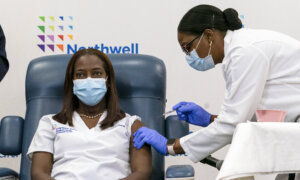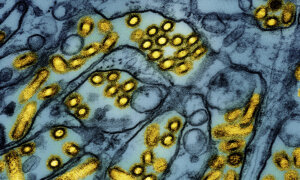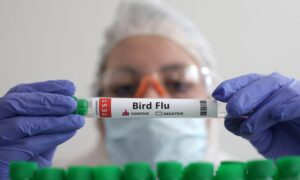The Los Angeles County Department of Public Health confirmed it is investigating additional cases of the dengue virus that was locally acquired in the city, according to a statement on Wednesday.
Two additional cases were found in Baldwin Park and among those who have “no history of travel to areas where dengue is endemic prior to their symptoms,” the health agency said.
Three cases of locally acquired dengue were reported, initially in a confirmed case of locally acquired dengue, according to the county health agency. The first case was found Sept. 9.
The three cases are an “unprecedented number of locally transmitted cases for a region where dengue has not previously been transmitted by mosquitoes,” the agency said. Previously, reported dengue cases in Los Angeles County were associated with travel to a country where the virus is spread locally.
“These additional cases of local virus transmission are a stark reminder for all Los Angeles County residents that simple steps to prevent mosquito breeding and mosquito bites can lower the risk of mosquito-borne diseases and prevent more sustained transmission in the future,” the department warned.
Dengue is transmitted through the bite of an infected Aedes species mosquito, which is common in Los Angeles, officials noted. But cases of dengue being transmitted locally “are extremely rare,” it added.
The city said that local officials are now increasing its mosquito-trapping efforts to identify and test the insects for dengue.
The statement advised local health care providers to be aware of possible dengue symptoms in patients who are suspected to have the virus.
“Reducing exposure to mosquitoes and the risk for mosquito bites are crucial to preventing transmission of mosquito-borne disease, including dengue fever,” said Los Angeles County Health Officer Muntu Davis in the statement.
Exposure to mosquitoes could be mitigated by the use of an insect repellent, keeping the home free of the insects by installing the proper screens on doors and windows, and removing standing water where mosquitoes breed, Davis said.
Earlier this year, the U.S. Centers for Disease Control and Prevention issued a health alert bulletin that doctors across the United States should be aware of dengue symptoms and signs, noting that cases of the virus have been on the rise worldwide and in the Americas.
Data provided by the CDC show that 5,000 cases of the mosquito-borne virus have been reported so far in 2024 across the United States, but the vast majority are cases associated with travel. Twenty-eight cases of locally acquired dengue have been reported this year, the data show.
Symptoms
Dengue, which is sometimes referred to as “breakbone fever,” is caused by a virus transmitted by a type of infected Aedes species mosquito’s bite.Health officials say that some people can experience no signs or symptoms of a dengue infection. But when symptoms do occur, they can be mistaken for another illness such as influenza.
Symptoms usually start between four and 10 days after being bitten by a dengue-infected mosquito, according to the Mayo Clinic. It generally causes a high fever of 104 degrees Fahrenheit and can include several other symptoms.
That includes muscle, bone, or joint pain; vomiting; nausea; pain behind the eyes; swollen glands; and a rash. In some cases, the symptoms can become life-threatening in what is known as “severe dengue,” dengue hemorrhagic fever, or dengue shock syndrome, the clinic says on its website.
The severe symptoms often can occur after the fever goes away and can include persistent vomiting, abdominal pain, fatigue, rapid breathing, bleeding gums or nose, blood in stool or vomit, restlessness, thirst, pale and cold skin, and weakness.
Complications from severe forms of the disease can lead to organ damage, severe bleeding, and breathing problems, says John Hopkins Medical School.
Since there is no specific treatment for dengue, the main focus involves dealing with pain symptoms.
Acetaminophen is generally used to deal with the pain, but drugs such as aspirin, ibuprofen, and other non-steroidal anti-inflammatory drugs are generally avoided because they increase the risk of bleeding, according to the World Health Organization.
According to a paper published in the National Library of Medicine, the most popular traditional herbs used for dengue are Carica papaya, or just papaya, and Euphorbia hirta, known as the Asthma-plant. Another research paper has noted that Cissampelos pareira, or velvetleaf, is sometimes used.













